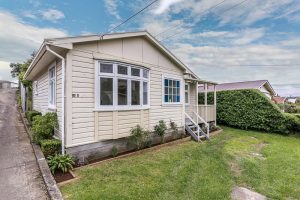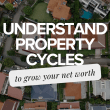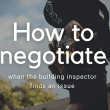“It sold for $200k more than the agent told me it would!”
Nothing frustrates a home buyer more than falling in love with a property, getting hooked in by the suggestion that it would sell in your price range, spending thousands on due diligence, only to get to the Auction and see it sell for hundreds of thousands of dollars over your budget.
The truth about quote prices…
In a booming market like the one we have witnessed over the last few years, particularly in Auckland & Wellington, most houses are being marketed without a price. The usual selling methods are Auction or Tender.
———————————————————–
Side note: What is a ‘set sale date’? I have seen a few of these around lately. It seems like every year agents dream up new ways of saying the same thing: “Please offer by this date or the owner will get mad at me…”
———————————————————–
These methods are designed to extract the best possible price from the market while bringing about a timely sale for the owner (and the salesperson).
With that comes the need for a discussion on price between the agent and the potential buyer. This often happens on the phone during the initial enquiry, or at an open home or viewing appointment.
Most agents try to be as vague as possible during this exchange which frustrates buyers immensely. The conversation usually goes something like this:
Buyer “Nice house. How much do they want for it?”
Agent: “It’s an Auction. They are keen to see what the market will pay.”
Buyer: “But surely you must have some idea what the owners want? I just want to make sure I’m not wasting my time.”
Agent: “The owners have asked us to find out what the market is willing to pay. The don’t want us to preclude any potential buyers from being involved in the process. The good thing is you can come along on Auction day and find out exactly what you need to pay to buy it…”
Cue exploding heads as the buyers’ frustration boils over.
This is understandingly frustrating for buyers to hear.
It forces you to decide where you see value for the property based on other houses you have seen, and that takes real mental energy which can be in short supply on a hot Sunday afternoon at your 10th open home of the day.

So why does it happen?
The flip side of the coin is that it is extremely dangerous for owners to put a price on their property in this market. Pitch it too low and they undersell their biggest asset. Pitch it too high and their open homes may be ghost towns as every buyer seems to be able to smell an overpriced listing from a mile away.
On top of this, most owners start out wanting an ‘above market’ price for their home, which is only natural (more on this later). Part of the reason for using Auction and Tender methods to sell houses is that the agents want to keep as many buyers as possible interested, by removing the price, while they spend the next 3-4 weeks giving the owners lots of feedback. They want to show the owners where the market sees the value of their property, before they get to the point where they start to look at offers.
If agents just marketed every home at the exact price the owner wants at the start of the campaign, there would be a lot of quiet open homes all over town and properties sitting on the market for 6 months or more until the asking price comes down.
What’s wrong with that you say?
Agents would argue it’s an inefficient system which makes it hard for them to manage lots of properties all at once 😉
In actual fact, by condensing the process into a 3-4 week timeframe with a deadline, salespeople are often able to create a competitive situation amongst interested buyers which helps achieve a higher price for the owner (who at the end of the day is the one paying the bill).
These are the dark arts of real estate sales. Agents walk a fine line of maintaining interest from buyers who are at the likely selling level, while helping the owner be prepared to see where their home actually sits in the market, not where they wish it did. It’s also fair that the owners expectations remain confidential until the end of the Auction or Tender process. They have chosen to sell their home that way and if you don’t want to be involved as a buyer, you don’t have to be.
In their attempt to keep buyers interested, while protecting the owners private expectations. The agents usually go down 2 possible paths when discussing price:
Path No.1: They offer a ‘quote price’ or ‘guide price’
It has become standard practice in many real estate offices to suggest a price to buyers which is low enough to garner as much interest as possible while still maintaining plausibility. You might here them say something like:
Agent: “We are introducing buyers over $600k…”
or sometimes they get creative:
“One of the neighbours offered the owners $600k before it went on the market but they turned it down. What do you think it’s worth?”
or, sometimes it can be even more vague:
“We think it’s likely to have a 6 in it. Where it sits above that, we don’t know.”
In Auckland they say: “It’s likely to have a 1 in it…” As if ‘anything above 1 million could qualify as a price guide.
No sh*t sherlock. 1 million or 10 million?
This ‘price talk’ determines the success or failure of the entire marketing campaign.
If the agent quotes a price that is too high, no one comes to the Auction and they look like a tool in front of their owners. If the agent quotes a price that is too low, then the wrong buyers might turn up and find out they can’t actually afford to meet the owners expectations.
The problem with quote prices is that the agents sometimes get a bit greedy and set these ‘guide prices’ too low, which understandably upsets the hell out of buyers who get pumped up and excited, only to come along to the Auction and watch their $600k+ future home sell to someone else for $954k
So why use a bullshit quote price in the first place?
Why not just tell us what the owners actually want?
It is human nature that nearly every single property owner in the world starts out thinking their home is worth more than it really is. We love our home, we are it’s biggest cheerleader. If we don’t defend the value of it, who will? Most real estate agents know this and are mindful that there is no point breaking an owners heart at the start of the process. Especially as that would usually mean you don’t get the job!
They will use words like “If that price is out there Mr & Mrs Vendor, our marketing plan will find it for you…”
It’s also important to let people dream a little bit. Heck, in this market they might just get their dream price.
Sometimes agents get genuinely surprised. Most of the time when a huge price is achieved in a rising market the agent didn’t predict it would sell for anywhere near that much. Buyers don’t tell them what they are going to pay before the Auction. Heck, buyers don’t even know themselves half the time what level they will go to once the heat of the Auction kicks in.
This is a common scenario:
The agent genuinely thought they were offering a realistic quote price, and then the marketing attracts multiple buyers who get into an Auction room and push each other up to a sale price point which no one else foresaw.
Should they be using the incredibly low quote prices which seem to be common place now? No, of course not.
How do you deal with it then? More on that further down.

The truth is that every property sits on a pricing spectrum.
What does that mean?
Let’s say a valuer visits your home and tells you it’s worth $550k. That is simply an educated guess at the end of the day. If you take that property to market, what are the chances someone will offer you exactly $550k? That’s right, very limited. Buyers will pay more or less depending on their needs, desires, past experiences (eg. houses they missed out on), timeframes and of course, their perceived level of competition.
That house could easily be worth anywhere from $500 – 650k, or more, depending on how many people are attracted to buy it and which recent sales they are using as comparisons.
Good agents are masters at creating competitive environments and in my experience can add an extra 5-10% to your market value with the right marketing plan combined with perfect staging / presentation and a bit of luck thrown in for good measure.
At the same time, none of us actually know what any property will sell for. We can give it an educated guess if we know the market but in actual fact agents get surprised all the time.
So how should agents discuss price with a buyer then?
Path no.2 The agent provides a report showing recent sales in the area (with photos).
This is a much, much better approach and while still frustrating to the buyer it is at least grounded in facts.
Note: The report must have photos. I’m not talking about a spreadsheet list of every sale in the suburb from REINZ, I’m talking about a detailed list of 6-9 reasonably comparable sales that have occurred in the last 1-6 months at most.
With the agent you can discuss which homes might be most comparable to the one for sale, gauge how much time has passed since those sales and extrapolate your own estimate of value from there. It helps massively if you have seen those other houses too so please, please, please make sure you visit lots of open homes BEFORE you are ready to buy.
Don’t even think about sticking your hand up at an Auction until you have visited at least 20 homes in that same suburb or it’s surrounding areas.
Nothing will help you learn the market quicker than viewing a home in person and finding out exactly what it sells for 3 weeks later.
How to cut through the agent ‘price talk’ and make better property decisions…
You need to start asking better questions.
Asking: “How much do the owners want?” Will usually get you a pretty vague response, especially if the agent is any good.
Instead, try asking:
Which recent sale would you compare this home to? In what ways did that home differ from this one? How has the market changed since then?
How many buyers typically bid or offer on a home like this in your experience?
What did the owners pay for this home? How far has the market moved since then in your opinion? What work have they done to the home since buying it?
Have the owners bought another home? How soon do they need to move? Sometimes the motivation and desire to sell matters more than the price expectation. If you have to go, you have to go.
Note: The agent must have the permission of the owners to disclose the answer to those last 2 questions.
In Closing: Take all quote prices with a large grain of salt.
For some reason we are skeptical about every single thing that comes out of a real estate agents mouth, except when it comes to the owners price expectations. We are so concerned about wasting our time, and so fatalistic about the market being out of our price range that we give up at the slightest suggestion of a price expectation that we think is too high.
The price an owner wants when they go to market, and the price they end up selling for are often two very different numbers. Owners are hoping to gain feedback from their open home visitors which can help them set a realistic expectation. You can help by telling the owner what you think it’s worth (even if it’s different from what they think). There is no right answer when it comes to valuing property and all information you give will be helping the owner make a more informed decision.
I hate the old real estate cliche “A house is only worth what a buyer is prepared to pay”. You know what that reminds me of? Lazy real estate agents who put a sign out by the straight, chuck a couple of photos on trademe and wait for the phone to ring.
For every house I have bought, the price I was prepared to pay was changing by the hour, as I rode the mental emotional roller-coaster of property acquisition. For every house I have sold, the price the owners were prepared to accept changed daily and wasn’t truly discovered until such time as they were confronted with a written, signed offer from a buyer.
A house is worth what a buyer will pay in a competitive environment where they have an emotional connection to the property and the fear of missing out.
Side note: Don’t ever discuss your potential renovation plans in front of the agent before you’ve bought the home. Nothing signals “We desperately want this house!” more than discussing your future plans for the home within earshot of the salesperson. Don’t let them see you measuring up for furniture either. You are only permitted to pull out the tape measure while the agent is not looking!
Further reading: 5 things you should never say to a real estate agent
Remember, over quoting can work in your favour.
If the agent is in your opinion over-quoting the property (and it’s above your price range) then don’t give up. Go along to the next few open homes. Hang around and watch how other buyers react when the agent has their price talk. If they cringe and walk away then chances are the agent is turning away a lot of potential buyers, which could reduce your competition on Auction day. Combine this with an owner who has genuine motivation to sell and you have a situation which is worth pursuing.
In a falling market you don’t often get the premium prices no one saw coming.
Sometimes the quote price becomes obsolete and embarrassing simply because the demand for a home pushes the final sale price way above the agents (and the owners) initial expectations. Way, way above their quote price. When the market starts to turn and tighten up a little bit you will see this happen less and less as Auctions will be fought out by 1, 2 or 3 bidders rather than 15-20 super-keen groups all vying for the same house.
If you have a funny (or heart-breaking) quote price story I would love to hear it. Please post in the comments below.
As always, stay safe out there people! If there is a question you would like me to answer in a future blog post, please email me.










“Have the owners bought another home? How soon do they need to move? ”
You might get into trouble with the Privacy Act with that one, Andrew. I told an auction buyer this once and he ended up using it to negotiate the price down! You have to be so careful what you say to buyers. You have to remember that we are required by law to represent the best interests of the vendor. If we end up quoting price expectations, what is the point of having an auction in the first place?
Hi Martin, thanks for your comment. I believe agents shouldn’t use quote prices. I will consider re-phrasing some of the points above to make that more clear. I agree with your points about the questions. Certainly no agent should divulge that information without the owners permission. Thanks for taking the time to read.